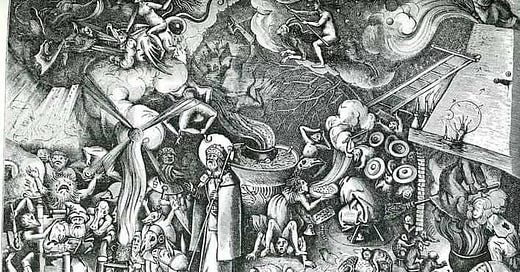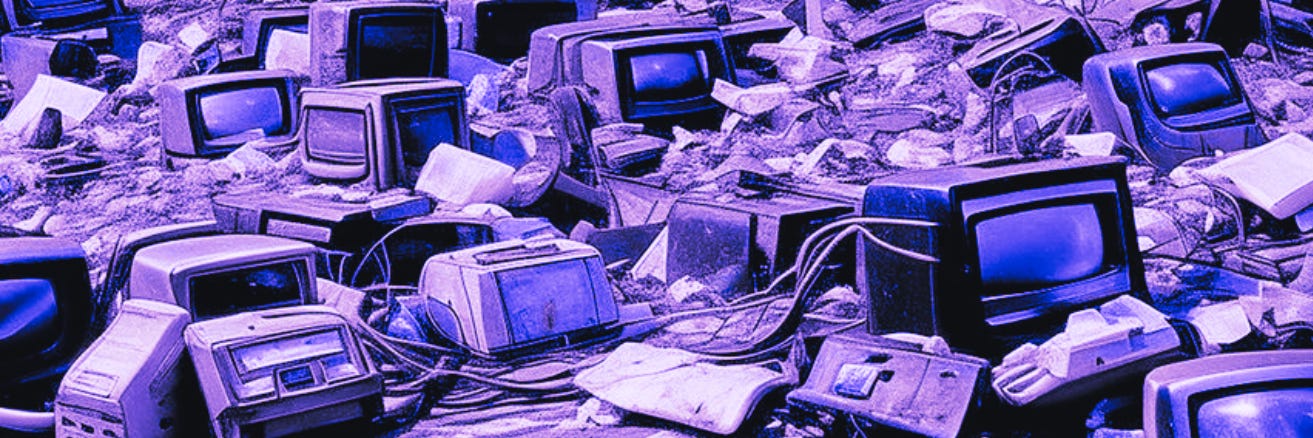Digital Flood and the Genesis of Gnosis
Mankind's esoteric quest to build the Tower of Babel 2.0
“All meaning alters with acceleration, because all patterns of political interdependence change with any acceleration of information."
—Marshall McLuhan, 1964
The Age of Hyper-Acceleration
By the time you finish reading this, several lifetimes' worth of new information will have entered the world. Billions of people will have come up with their own interpretations of the information they are confronted with, while a small elite taps into ancient esoteric knowledge to rebuild the Tower of Babel.
Throughout human history, information has been transmitted through various mediums, with each advancement accelerating the creation, distribution, processing and consumption of new and existing information while significantly expanding its reach. Mankind’s obsession with information is part of our fallen nature and prideful search for gnosis, since Adam and Eve were exiled from the garden of bliss into the world of information. This unending pursuit for secret knowledge is what drives science and technological advancement and has brought us to our current state, a crisis of humanity itself.
The information age is often thought of as the 3rd industrial revolution, the digital age of technology in which we currently live. But information is not at all a result of the digital age, rather the digital age is the hyper acceleration of information generation and consumption. Self proclaimed accelerationists at the forefront of technological advancement aim to leverage information to transform mankind into a new species; machine-gods made in man's image. While the technologies have advanced, the same gnostic pursuit of the ancient world is manifest in the religion of the future. The carved idols of false gods animated with fallen spirits are now machines animated with information.
We have allowed these machines and their creators to colonize our civilization and in return they are worshipped as gods. Not only did we invite the Cyborg Theocracy to rule over us, we collectively wait in line for the latest upgrades.
These are the days of the digital flood. By 2025, it’s estimated that 463 exabytes of data will be created each day globally. Do you even know what an exabyte is? To put this in perspective, it is the equivalent of roughly 212 million DVDs worth of new data, entering the digital world daily, ex nihilo.1 If even 80% of the world's smart phones take 10 pictures a day, that is about 15 trillion photos taken per year.
An infinite deluge of entertainment, propaganda, doom and mental illness comes surging through our screens at a rapidly accelerating intensity, with no filter, no direction and no order. AI now effortlessly automates information acceleration with diminishing human effort, producing mass confusion in visual and audible form. We've been colonized by digital technology. As a result, we are in a collective state of disillusionment and disorientation, groomed for the coming of Antichrist.
"Electric information environments being utterly ethereal foster the illusion of the world as spiritual substance. It is now a reasonable facsimile of the mystical body of Christ, a blatant manifestation of the Anti-Christ. After all, the Prince of this world is a very great electric engineer."
—Marshall McLuhan
More human cognitive traits are being used to anthropomorphize machines; words such as learning, smarter, consciousness, thinking, intelligence and memory. This Babelesque confusing of information abundance is a feature of the digital age, not a bug. There are no brakes to slow down technological advancement while its innovators have adopted acceleration as their personal identity.
Information In Formation
Information itself is not knowledge or intelligence, though human interpretation and knowledge is required to perceive it as such. Petrichenko and Semenova define information as "a form of transmission of human experience (knowledge)." The distribution and processing of information changes as new technologies synthesize the experience transfer of previous mediums to the next.2 Claude Shannon, known as the godfather of information theory, considered information as any signal that could be distinguished from the noise of the medium. A buzzing radio transmission or static noise, does not become information until a discernible message is received by the listener. For information to even be considered information, it necessitates human knowledge and experience. Marshall McLuhan, the "father of media studies", gives an example that an illumined lightbulb does not become information until it is used to light up letters in a sign.
By this definition, the information age began at creation. The sheer amount of information that flooded into the fallen world, concentrated in one unified language, quickly led to mankind's collaborative faustian quest to transcend the limits of creation itself by seeking gnosis through technological advancement. According to the pseudepigraphal book of Enoch, each technology and science was taught to man by a particular fallen angel to corrupt mankind after defiling human women through fornication.





